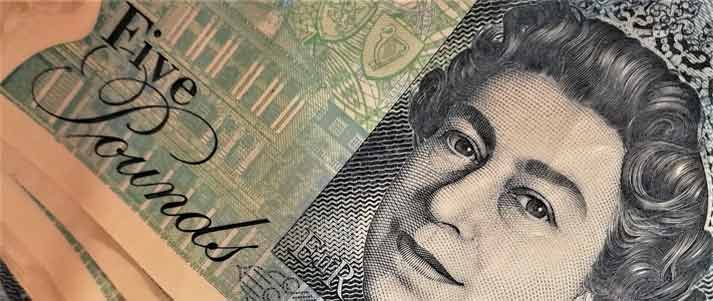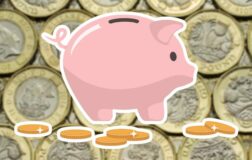“My first payday loan was £100 for a night out. 5 years later I was in £26k of debt”
Most of us are aware of the dangers of payday loans, but Danny Cheetham's story goes to show just how quickly things can spiral out of control.

We've all seen the adverts. We all know the major payday loan companies. We're all aware that the loans come with four-digit interest rates. But it's not until you hear the story, warts and all, of someone with payday loan debt, that you can fully understand the dangers that they pose.
Danny Cheetham first took out a payday loan when he was 19 years old and studying at university. Just under five years, and several payday loans later, Danny found himself in £26,000 of debt.
When we got in touch with him back in 2018, Danny was 29 and, fortunately, on the road to becoming debt-free. We spoke to him about how his relationship with payday loans became so troublesome, and how he'd managed to turn his life around.
Taking out his first payday loans

Credit: John6536 - Flickr
Danny's first experience with payday loans came in 2008 when he was just 19 years old. As a student at the University of Salford, Danny supplemented his Maintenance Loan with the income from two part-time jobs.
I was always quite good with my money and had no debt at all at this point – except Student Finance, of course.
But life can be unpredictable. Budgeting needs to be a major part of starting each year at university; actually thinking about the month after next, and not just getting through the first month.
Trouble struck when he was invited to a club night in nearby Blackpool. Payday was coming up, but Danny was a little short of what he needed to make the trip.
I realised I needed train tickets, a B&B and some money to have a good night.
I worked out that if I borrowed the lowest amount (£100) then I'd be covered. The interest was only going to be around £22, on top of the principle amount borrowed.
While we strongly advise that you live within your means and wouldn't classify a night out as a justifiable reason to borrow money, it seems that Danny at least had a firm plan of action for how he'd repay his payday loan. And, in this instance, Danny did repay it pretty quickly.
Skip forward a month, once the first debt had been repaid in full, and money was starting to run a little short again.
I'd spent money on getting my laptop fixed and realised I was going to end up with a fee from the bank if my direct debit bounced.
I applied and got offered a higher payday loan this time. The fee for a bounced direct debit was £35*, and to me it seemed better to be in credit in the bank and pay a smaller fee on the loan.
* As Danny himself points out, the fees for bounced payments are now a lot lower, if not free, if you choose the right bank account.
Of course, if you continue to need payday loans, the chances are you've not got a great deal of money lying around. And if you've not got much money lying around, you'll soon be unable to repay the debt in full at the first opportunity. Once that happens, the interest really starts to kick in.
How Danny's payday loan debt spiralled

Danny's situation was made all the worse by the fact that he developed a serious gambling addiction. In his own words, he said that getting approved for loans gave him "a similar feeling" to the rush of gambling.
At the time, he initially tried to use gambling as a way to clear his payday loan debt.
I often hatched up a statistical plan using odds, trying to figure out how I could use accumulator bets to get enough money from 'just a few' matches.
I'd also try to get decent wins on a slot machine – anything that would give me the amount needed to get the loans cleared.
However, despite experiencing some success with gambling, the lows by far outweighed the highs.
Unfortunately the 'joys' of addiction don't work as simply as that.
I was often able to win fairly considerable amounts, but I was always drawn in by the temptation of making these winnings bigger. I'd split the money into several smaller bets to try achieving a higher end result. In the end, this became my downfall.
At this point, you're probably wondering how Danny was allowed to continue borrowing money when he already had a few payday loans, most of which were going straight into gambling.
When it comes to borrowing money, you usually have to show the lender a whole host of documents to prove that you'll be able to pay it back. These checks are usually pretty rigorous – or, at least rigorous enough that most of the people accepted will have a good chance of repaying the debt.
But that's not the case with payday loans.
As Danny explains, despite having several payday loans on the go at once, companies were still happy to lend to him.
Many payday lenders would ask to see bank statements, but they'd still decide to lend additional money, using the justification that I had a “good” credit score.
There was an alarming rate of lending at the time that would involve no human interaction. It was literally just a form online, and 20 minutes later an automated deposit into your bank account.
Danny says that at his very worst moment, he had 26 active payday loans. He was only managing to make the minimum repayments on each one.
It was coming up to my 24th birthday and I decided to face up to the situation I was in and actually put a value on my total debts.
It came in at around £26,000 – literally an eye-watering amount.
I was in a battle at the time where I was repaying around £1,700 a month in interest alone.
How to get out of payday loan debt

£26,000 is a lot of debt to repay in any scenario. But with the interest rates of payday loans, clearing a debt that large seems impossible – especially considering that Danny was repaying £1,700 every month in interest alone. To put that in context, you'd have to earn around £25,000/year to have enough money (after tax) to cover just these payments.
Clearly, getting out of the debt was never going to be a straightforward task – nor was deciding to do something about it in the first place.
I only made the decision to change things a couple of years ago. My entire life had just become thinking about how I could get out of debt, followed by a series of rather ludicrous bets, or a plan that was just never achievable.
Once Danny had decided he was going to dig himself out of his debt, he now had to figure out how to do it. This time, rather than looking for ways to make money quickly, Danny tried to deal with the causes of his problems – not just the symptoms.
I started by finding ways to block my access to gambling. After that, I wrote to every single lender, giving them a comprehensive breakdown of my situation.
I asked them to freeze the interest, and even to consider whether or not lending to me was technically irresponsible.
The results were a bit of a mixed bag. Many agreed to freeze the interest and give me a chance to repay, while others did nothing like this and continued to let the interest grow.
However, while not every lender agreed to cooperate with Danny, he still saw the process as a positive one.
The best result from all of this was that every lender now knew I had an issue, so in theory, would never lend to me again.
Since then Danny has slowly but surely been chipping away at his debts. When we spoke to him, he was aiming to be debt-free by 30.
Alternatives to payday loans

Despite the dangers of payday loans being so well-publicised, the unfortunate reality is that they can seem like the only option for many people.
As someone who has been in that very position himself, Danny is better placed than most to empathise with students who are considering taking out a payday loan. So, what's his advice?
Think twice, then think for a third time.
If you're in a position where you're struggling financially, speak up. Tell friends and family – you'd be surprised how many are actually in a position where they might be able to help.
Should your family and friends be unable to help with your financial troubles, Danny still doesn't think you should turn to a payday lender.
He rightly says that credit cards come with a much lower rate of interest than payday loans. They could be the better option if it's a straight choice between the two.
However, credit cards are not a perfect solution, and we'd strongly advise against using them as a primary method of escaping debt.
Fortunately, Danny also has a number of other suggestions.
For larger sums, try reaching out to credit unions in your area. Many are now starting to let you borrow twice the amount that you've saved, so if you're able to save here and there when you can, it can be a decent backup option.
Credit unions are non-profit organisations that offer savings, loans and other services. They're owned and run by their members, so the emphasis is on providing a good service, not making money.
That said, while credit unions are arguably kinder than banks and payday loan providers, they are a lot more difficult to secure a loan from. If you're unable to get support from a credit union, or only need to make up a smaller sum, Danny has a few other suggestions, too.
Look around where you're living, or in your bedroom back at home. Is there anything that you've got that you just know will never be given the love that you used to?
If so, you might be able to sell these items and get the extra money you need in the short term.
We're fully behind Danny on this one. In fact, we have guides to the things you can sell right now and the childhood toys you may own which could be worth thousands.
Beyond that, Danny recommends looking for work and speaking to your university.
Look locally to see if there are any seasonal or one-off events coming up. Many may end up needing additional staff at short notice, so get in touch to tell them that you're available to step in should anything come up.
If you're at a point where you feel anxious or unsure about what to do, speak to your university. They will have people who might be able to help you out, or put you in touch with services and schemes that you may not have been aware of.
Just remember that you're not alone. Whatever way you get over this hurdle, it's not worth making any rushed decisions that will cost you in the long term.
What changes should be made to payday loans?

Although they were relatively unregulated when they first came onto the market, payday loans have recently become subject to stricter regulations.
For instance, all lenders must now appear on at least one comparison site, and they must "prominently" link to a price comparison site on their own site.
What's more, borrowers can no longer be forced to pay any more than 0.8% of the amount borrowed per day, and will never have to pay more than 100% of the loan in fees and charges.
When we asked Danny what he thought of the changes, he saw them as the first step on a very long road in the right direction.
They are the start which is needed. The drive now needs to start for the payday lender to take responsibility for the way these loans can grow at rates which are unjustified.
I'm also a very big believer in human hurdles when people are taking out finance. The decision to borrow money shouldn't be allowed to take place online, controlled by algorithms.
There should at least be a quick call, almost a courtesy call, to make sure everything is ok, and to complete the final checks.
There's a large number of vulnerable people who might impulsively make decisions which shouldn't be made without time for consideration.
Danny also believes that, given the often perilous situation that people taking out payday loans find themselves in, the terms of the borrowing need to be more considerate.
Many people borrow from payday lenders at a time of absolute need, or at points of vulnerability.
There should be lower interest rates, but over an extended period of time. This way the borrower would repay a similar amount in total, but be given more time to do it.
Not only does this give them the opportunity to actually get out of their situation, but it even presents the chance to save money if they're able to repay it more quickly.
Despite much of the blame clearly lying at the feet of payday lenders, Danny feels that better financial education could also help prevent more people from ending up in the situation he found himself in.
Payday lenders often target people by advertising the smaller end of the scales and costs. They often suggest that they can be used as a lifeline, and it's a very easy spiral to fall into.
Payday loans should be a 'lesson learnt' kind of thing. Students at university now have the chance to see people who have previously been there, who have made mistakes like I did, and who have had to repay for a lot longer.
Before you even consider taking out a payday loan, make sure you've read our tips on how to deal with debt at university.








